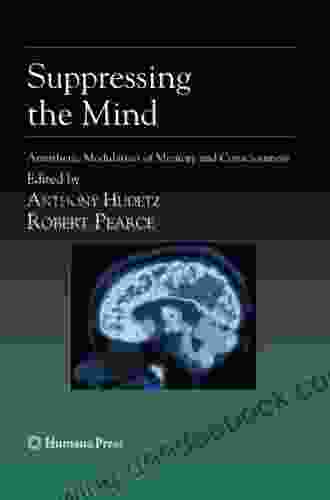Anesthetic Modulation of Memory and Consciousness: Contemporary Clinical Perspectives

Anesthetics are widely used in modern medicine to induce a state of unconsciousness during surgical procedures. The ideal anesthetic agent should provide rapid onset and offset of action, produce amnesia, and have minimal side effects. However, growing evidence suggests that anesthetics may also have significant effects on memory and consciousness beyond their immediate sedative effects. In this article, we review the latest research on the anesthetic modulation of memory and consciousness, focusing on contemporary clinical perspectives.
4 out of 5
| Language | : | English |
| File size | : | 3073 KB |
| Text-to-Speech | : | Enabled |
| Screen Reader | : | Supported |
| Enhanced typesetting | : | Enabled |
| Print length | : | 502 pages |
Anesthetic-Induced Amnesia
One of the most well-established effects of anesthetics is their ability to induce amnesia. Amnesia is the loss of memory for events that occur during the period of anesthesia. The extent and duration of anesthetic-induced amnesia vary depending on the type of anesthetic used, the dose administered, and the individual patient. However, even brief exposure to anesthetics can produce significant memory impairment.
Several mechanisms have been proposed to explain anesthetic-induced amnesia. One possibility is that anesthetics disrupt the formation of new memories in the brain. Another possibility is that anesthetics impair the retrieval of memories that were formed prior to anesthesia. It is also possible that anesthetics have both anterograde (impairing the formation of new memories) and retrograde (impairing the retrieval of old memories) amnesic effects.
Neuroimaging Studies of Anesthesia
In recent years, neuroimaging studies have provided new insights into the neural mechanisms of anesthesia. Functional magnetic resonance imaging (fMRI) and electroencephalography (EEG) studies have shown that anesthetics produce widespread changes in brain activity. These changes include:
- Decreased activity in the default mode network, which is a network of brain regions that is active when the brain is at rest
- Increased activity in the salience network, which is a network of brain regions that is involved in detecting and responding to novel stimuli
- Disruption of functional connectivity between different brain regions
These neuroimaging findings suggest that anesthetics produce a state of altered consciousness that is characterized by decreased awareness of the external environment and impaired cognitive function.
Clinical Implications
The findings on the anesthetic modulation of memory and consciousness have important clinical implications. For example, the amnesic effects of anesthetics can lead to postoperative confusion and delirium. In some cases, postoperative cognitive dysfunction can persist for weeks or months after surgery. Anesthetics may also have long-term effects on memory and cognition in vulnerable populations, such as the elderly and those with pre-existing neuropsychiatric disorders.
The recognition of the cognitive side effects of anesthetics has led to a growing interest in developing new anesthetic agents and techniques that minimize these effects. For example, some studies have shown that the use of regional anesthesia, which involves blocking the nerves that supply a specific area of the body, can produce less cognitive impairment than general anesthesia. Other studies have shown that the use of volatile anesthetics, such as sevoflurane and desflurane, can produce less cognitive impairment than intravenous anesthetics, such as propofol.
Future Directions
Further research is needed to better understand the anesthetic modulation of memory and consciousness. This research should focus on:
- Identifying the specific mechanisms by which anesthetics produce amnesia and altered consciousness
- Developing new anesthetic agents and techniques that minimize cognitive side effects
- Investigating the long-term effects of anesthetics on memory and cognition
By addressing these questions, we can improve our understanding of anesthesia and its effects on the brain, and we can develop better ways to care for patients undergoing surgery.
Anesthetics are essential medications that play a vital role in modern surgery. However, it is important to be aware of the potential cognitive side effects of these medications. By understanding the mechanisms of anesthetic-induced amnesia and altered consciousness, we can develop better ways to minimize these effects and improve the safety of anesthesia.
4 out of 5
| Language | : | English |
| File size | : | 3073 KB |
| Text-to-Speech | : | Enabled |
| Screen Reader | : | Supported |
| Enhanced typesetting | : | Enabled |
| Print length | : | 502 pages |
Do you want to contribute by writing guest posts on this blog?
Please contact us and send us a resume of previous articles that you have written.
 Page
Page Chapter
Chapter Reader
Reader Paperback
Paperback Bookmark
Bookmark Foreword
Foreword Preface
Preface Synopsis
Synopsis Manuscript
Manuscript Codex
Codex Tome
Tome Bestseller
Bestseller Classics
Classics Autobiography
Autobiography Memoir
Memoir Reference
Reference Encyclopedia
Encyclopedia Thesaurus
Thesaurus Narrator
Narrator Resolution
Resolution Librarian
Librarian Catalog
Catalog Card Catalog
Card Catalog Archives
Archives Periodicals
Periodicals Study
Study Scholarly
Scholarly Lending
Lending Reserve
Reserve Academic
Academic Reading Room
Reading Room Rare Books
Rare Books Interlibrary
Interlibrary Literacy
Literacy Study Group
Study Group Dissertation
Dissertation Storytelling
Storytelling Book Club
Book Club Theory
Theory Textbooks
Textbooks David Watson
David Watson Andrej Brummer
Andrej BrummerStan Bendis Kutcher
 H Kent Baker
H Kent Baker Ronald L Smith
Ronald L Smith Debra Lynn
Debra Lynn Tony Clunn
Tony Clunn John Atlas
John Atlas Elithe Hamilton Kirkland
Elithe Hamilton Kirkland Anthony Butler
Anthony Butler Louise Gilbert
Louise Gilbert Daniel O Klier
Daniel O Klier Edwin Page
Edwin Page Joseph Jaworski
Joseph Jaworski Chad Craft
Chad Craft David Allen Bergin
David Allen Bergin Mourning Dove
Mourning Dove Edward Espe Brown
Edward Espe Brown Ines Thorn
Ines Thorn J David Cooper
J David Cooper
Light bulbAdvertise smarter! Our strategic ad space ensures maximum exposure. Reserve your spot today!
 Cortez ReedFollow ·16.2k
Cortez ReedFollow ·16.2k Dan HendersonFollow ·9.3k
Dan HendersonFollow ·9.3k Lee SimmonsFollow ·8.6k
Lee SimmonsFollow ·8.6k David Foster WallaceFollow ·13.4k
David Foster WallaceFollow ·13.4k Charles DickensFollow ·11.5k
Charles DickensFollow ·11.5k Edgar CoxFollow ·15.4k
Edgar CoxFollow ·15.4k Demetrius CarterFollow ·3k
Demetrius CarterFollow ·3k Robert HeinleinFollow ·16.1k
Robert HeinleinFollow ·16.1k

 Darius Cox
Darius CoxThe Gathering Pacific Storm: An Epic Struggle Between...
The Gathering...

 Hugo Cox
Hugo CoxHow CIA-Contra Gangs and NGOs Manufacture, Mislabel, and...
In the annals of covert operations, the CIA's...

 Finn Cox
Finn CoxDr. Brandt's Billionaires Club Series: The Ultimate...
A Journey into the Pinnacle of...

 Isaac Asimov
Isaac AsimovCurrent Affairs Daily Digest 20180730 30th July 2024
National ...

 Felix Carter
Felix CarterBroadway Celebrates The Big Apple Over 100 Years Of Show...
Broadway Celebrates the Big Apple: Over 100...

 Beau Carter
Beau CarterThe Big Book of Flute Solos: A Comprehensive Collection...
If you're a flute player,...
4 out of 5
| Language | : | English |
| File size | : | 3073 KB |
| Text-to-Speech | : | Enabled |
| Screen Reader | : | Supported |
| Enhanced typesetting | : | Enabled |
| Print length | : | 502 pages |












